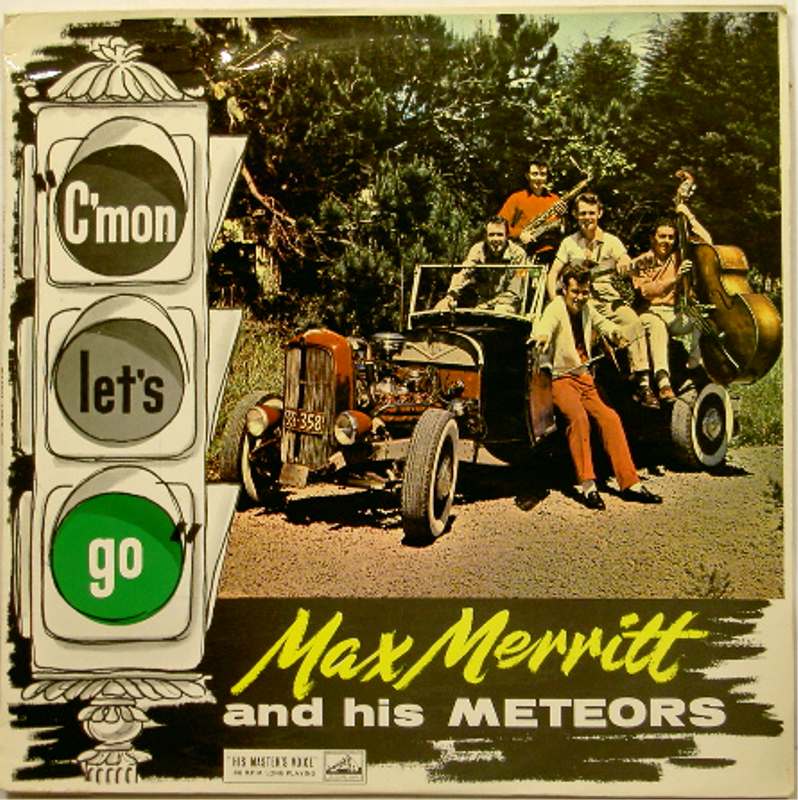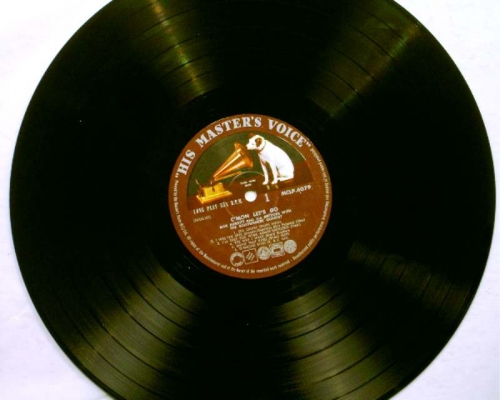

| Product Code: | MCLP 6079 |
| Artist: | Max Merritt and His Meteors |
| Origin: | New Zealand |
| Label: | His Master's Voice (Early 60s) (1960) |
| Format: | LP |
| Availability: | Enquire Now |
| Condition: |
Cover: VG
Record: VG+
|
| Genre: | Pop , Rock , Rock & Roll U |
Extremely rare original New Zealand 1960s Mono pressing on HMV label. Vinyl in very goog condition, very nice glossy flapback cover showing rubbing on seams and minor shelf wear).
Max Merritt was born in Christchurch on 30th April 1941 and by his early teenage years was engrossed in music, beginning guitar lessons at the age of twelve. By the mid-fifties, rock and roll had exploded around the world and Max was quite taken by the styles and sounds of Elvis Presley and Bill Haley. Max left school in 1956 to serve an apprenticeship under his brick-laying father. Buying himself an electric guitar, he formed his first group, the Meteors, in 1956. The group was made up of friends Ross Clancy on saxophone, Ian Glass on bass, Peter Patene on piano and Pete Sowden on drums.
His mother Ilene became concerned seeing young people sitting around Cathedral Square on winter Sunday afternoons with nothing to do, so with the help of her family decided to hold Sunday dances. Also with the help of Kerridge-Odeon theatre manager Trevor King, a venue was set up. The Christchurch Teenagers Club held in the Railway Hall in Sydenham, became so popular that up to 900 youngsters attended the dances held between 1pm and 6pm. For a charge of two shillings and sixpence, dance-goers were treated to music provided by a teenage Max Merritt and the Meteors, while a buffet tea of scones, sandwiches and hot saveloys was served by Mrs Merritt and her daughter Pam.
Along with gigs at the Teenage Club, Max and the boys played many shows and charity concerts organised by Trevor King, and raised thousands of dollars for the charities over the next few years. By 1957 the Teenage Club was the only regular rock and roll venue. During 1958, the original saxophone player Ross Clancy left and he was replaced by Will Schneider.
Meanwhile up in Auckland there was another rocker who was creating a storm. He was Johnny Devlin and by the end of 1958, he had conquered the North Island, but was still relatively unknown in the South Island. A tour down there was going to be a challenge for him as Max was already there and was attracting much attention. Max's fans were fiercely loyal and the bookings for Devlin's Christchurch show were light, as Max had a show booked for the same night. Devlin's manager, Graham Dent, was going to cancel the show, but came up with an idea. He invited MP and Cabinet Minister Mabel Howard to a champagne party followed by the Devlin show, after which the pair would be driven off to meet up with Max Merritt, who was playing at a 'Rock'n'Roll Jamboree' charity concert. A pink convertible was used and of course the press were there, along with the usual mob of screaming fans. It was stroke of genius on the part of Dent and after watching Max perform, he enthusiastically sang their praises to Auckland promoter Harry M Miller.
By 1959 the Teenage Club had added Wednesday nights to its schedule. Max was becoming very busy, bricklaying by day, performing by night, he soon became the hottest attraction in the Garden City.
In 1959 New Zealand signed the Antarctic Treaty with the USA and Operation Deepfreeze was set up at Christchurch Airport. This meant that there were a large number of American servicemen constantly in the area. They had to rely on their own base jukebox or their personal record collections for a taste of their style of music. That is of course until some of the guys came across the goings on at the Teenage Club. The club had changed somewhat from its original days, but was still based entirely around Max Merritt and the Meteors. Pretty soon the young servicemen at Operation Deepfreeze were turning up at the club armed with imported copies of recently released US recordings, which they would lend to Max and a week later he and his band would be playing these tunes. With the help of these recordings, Max's band moved away from their original influence of Haley and Presley, and used these obscure R&B records to develop a much rougher sound.
Another youngster, also from Christchurch, who was putting together a band and providing some good music, was Ray Columbus. His first group was put together when he was 17. On drums was his friend Peter Ward, along with Billy Karaitiana (also known as Billy Kristian) on bass. Someone else played guitar, until they found a more competent guitarist in Andy Joines. As a quartet they tried playing to anyone who would listen around the Christchurch area.They didn't last long as a group and shortly afterwards, Billy and Peter left to join Saki and the Jive Five. They began playing around Christchurch and became stiff opposition for Max Merritt and the Meteors, who had the local scene well to their liking. Max checked them out and it wouldn't be long before Billy would move into a permanent position with Max Merritt and the Meteors.